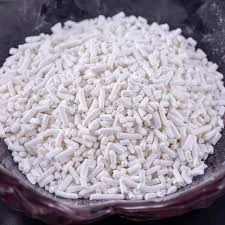
Understanding Aspartame Its Uses Health Effects and Controversies Explained
What is Aspartame?
Aspartame is an artificial sweetener widely used in numerous food and beverage products as a low-calorie sugar substitute. It is approximately 200 times sweeter than sucrose (table sugar), which means only a small amount is necessary to achieve the desired sweetness. This unique property makes aspartame particularly appealing for those looking to reduce their caloric intake or manage their weight, which has contributed to its popularity in diet sodas and sugar-free food items.
Chemical Structure and Composition
Aspartame is a dipeptide methyl ester composed of two amino acids phenylalanine and aspartic acid. When consumed, aspartame is broken down in the body into its constituent amino acids and methanol. This metabolization process is similar to how the body processes natural proteins. However, it is essential to note that individuals with the genetic disorder phenylketonuria (PKU) cannot metabolize phenylalanine effectively. Consequently, they are advised to avoid aspartame and products containing it due to the potential for harmful accumulation of phenylalanine in their bodies.
Safety and Regulation
Aspartame has been the subject of extensive research since it was first discovered in 1965. Numerous scientific studies have evaluated its safety for human consumption, leading to its approval by various health organizations worldwide. The U.S. Food and Drug Administration (FDA) approved aspartame for use in foods and beverages in 1981. Since then, other organizations, including the European Food Safety Authority (EFSA) and the World Health Organization (WHO), have affirmed its safety. These bodies conduct regular reviews of the available scientific data and continuously monitor studies related to the substance.
Despite its wide acceptance, aspartame remains controversial among some consumers. Over the years, numerous claims have linked aspartame to various health issues, including headaches, weight gain, and even more severe conditions such as cancer. However, comprehensive reviews and meta-analyses have consistently concluded that there is no credible evidence to support these claims. In fact, prominent health organizations state that aspartame is safe for the general population when consumed within the established acceptable daily intake levels.
aspartame what is it

Caloric Concerns and Uses
The caloric advantage of aspartame is one of the main reasons for its incorporation into many products. By replacing sugar with aspartame, manufacturers can create low-calorie or “diet” versions of beverages and snacks that appeal to health-conscious consumers. For instance, diet sodas and sugar-free desserts often contain aspartame as a key ingredient.
However, while aspartame helps in calorie reduction, it is not a silver bullet for weight loss. Some studies suggest that artificial sweeteners could influence appetite or cravings, leading to compensatory eating behaviors that might counteract the caloric benefits. Thus, individuals seeking weight management should consider their overall dietary patterns and lifestyle rather than relying solely on products containing aspartame or similar sweeteners.
Consumer Awareness and Future Research
As consumer awareness regarding food ingredients grows, the scrutiny of sweeteners like aspartame continues. It is essential for individuals to read food labels and understand what they are consuming, especially if they have certain dietary restrictions or health conditions.
Future research will likely expand our understanding of aspartame's long-term effects and its role in nutrition. As the food industry evolves and consumer preferences shift, innovations and alternatives to aspartame may emerge, prompting continued discussions regarding the safety and efficacy of artificial sweeteners.
In conclusion, aspartame is a widely utilized artificial sweetener recognized for its low-calorie profile and intense sweetness. While extensive evidence supports its safety for public consumption, it remains essential for individuals to stay informed and mindful of their dietary choices. The ongoing dialogue surrounding sweeteners is crucial as society embraces a more health-conscious approach to food consumption.
-
Aluminum Hydroxide: Quality Gels & Dried Gel AntacidNewsAug.31,2025
-
Buy High-Quality Trichloroisocyanuric Acid for Sale | TCCA 90% SupplierNewsAug.30,2025
-
Pure Sodium Dichloroisocyanurate Dihydrate | Powerful DisinfectantNewsAug.29,2025
-
Industrial Chemicals: Quality & Purity for Every IndustryNewsAug.28,2025
-
Nitrile Rubber Honoring Strict Production StandardsNewsAug.22,2025
-
Aspartame Ingredients Honoring Food Safety ValuesNewsAug.22,2025
-
Fertilizer for Balanced Plant NutritionNewsAug.22,2025
Hebei Tenger Chemical Technology Co., Ltd. focuses on the chemical industry and is committed to the export service of chemical raw materials.
-

view more DiethanolisopropanolamineIn the ever-growing field of chemical solutions, diethanolisopropanolamine (DEIPA) stands out as a versatile and important compound. Due to its unique chemical structure and properties, DEIPA is of interest to various industries including construction, personal care, and agriculture. -

view more TriisopropanolamineTriisopropanolamine (TIPA) alkanol amine substance, is a kind of alcohol amine compound with amino and alcohol hydroxyl, and because of its molecules contains both amino and hydroxyl. -

view more Tetramethyl Thiuram DisulfideTetramethyl thiuram disulfide, also known as TMTD, is a white to light-yellow powder with a distinct sulfur-like odor. It is soluble in organic solvents such as benzene, acetone, and ethyl acetate, making it highly versatile for use in different formulations. TMTD is known for its excellent vulcanization acceleration properties, which makes it a key ingredient in the production of rubber products. Additionally, it acts as an effective fungicide and bactericide, making it valuable in agricultural applications. Its high purity and stability ensure consistent performance, making it a preferred choice for manufacturers across various industries.





